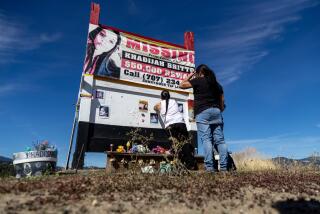Now, That’s a Family Reunion : Salvation Army’s Missing Persons Bureau helps close relatives re-establish contact.
Nearly 25 years ago, when she was 15, Susie Sirota found her birth certificate and was shocked to learn that her father was a man she never knew about.
Last summer, the Northridge mother of two, now 39, finally met this man, thanks to the Salvation Army’s Missing Persons Bureau, which has been tracking lost relatives since 1891.
Sirota’s story is fairly typical. Her father, who had contracted malaria during World War II and was discharged from the Army, met Sirota’s mother, a Hungarian emigre, in Los Angeles in 1951. He married her two weeks later and left less than a month after the wedding.
Sick, pregnant and penniless, Sirota’s mother moved in with a friend until her daughter was born the next year. Eventually the marriage was dissolved. In 1954 she married again, to be divorced again soon afterward. Until 15-year-old Susie found the birth certificate bearing a different name, she thought that her mother’s second husband was her dad.
When confronted, her mother refused to discuss it. The episode seemed so painful that Sirota felt uncomfortable questioning her.
But when her own children were born, Sirota yearned to know her genetic background. “I’m part of him,” she explained. “I wanted to know my medical history. I needed to answer the questions in my heart.”
Last summer, she heard about the Salvation Army’s service and asked for help.
From her birth certificate, she was able to look up her parents’ marriage license to find her father’s place of birth and his mother’s maiden name. To begin a search, said Maj. Gerry Hood, who heads the Los Angeles office, “we need a point to start from.” She works with one full-time and one part-time secretary.
Hood used Social Security records to locate Sirota’s father in Virginia, and six months after beginning her quest, Sirota received a phone call from a man saying he was a cousin of the person she sought.
“I told him I didn’t want anything, I just wanted to meet my father,” she said. A week later, she received a postcard, then a telephone call, from her father, now 69. He said that when he left Los Angeles, he was so ill with malaria that for a long time he remembered nothing about his time there. He said he later tried to find Sirota’s mother, but had no luck.
Last summer, Sirota visited him in Virginia, and now, she said, he is trying to build a relationship with her children.
It’s thrilling to hear about successful reunions, said Hood, a 40-year Salvation Army veteran who has been tracking missing people for 9 1/2 years.
“We once found a son who kept throwing away our letters. The wife finally convinced him to contact us and to see his father. He finally did, and the father died the next day.”
The Salvation Army, founded in England in 1865, took its first missing-person case in 1891, when a mother in England lost track of a daughter who had moved to the Colonies.
Last year, Hood said, the organization had 3,000 search requests and accepted 900. There are now about 2,000 active cases--200 of which are requests from overseas--and last year more than 450 people were located.
“We just keep looking until we either find them or run out of leads,” Hood said.
The service, she said, was relatively unknown until a 1984 Dear Abby column.
“I can always tell without reading the paper when Dear Abby runs a letter about us, because we then get a heavy influx of inquiries,” Hood said with a chuckle.
For a $10 non-refundable donation, the Salvation Army will look for a close relative (it does not look for adoptees, runaway adult children or people who owe you money). The person sought must have been missing for at least four months, except in emergencies such as a death or a life-threatening illness.
Most of the separations result from divorce, Hood said, with family feuds the second biggest reason relatives lose touch. After locating a person, the Salvation Army writes a letter asking that person to contact the office. “Then we give them more information on the telephone,” said Hood, noting that she tries to be discreet. “We don’t want to disrupt another family’s life.”
And if a person doesn’t want to be found, well, that’s OK. She said only about 5% of the people they find want to stay lost. “Most people want to be found. Some say, ‘I never knew I was missing.’ ”
Sirota said finding her father, who never remarried and has no other children, didn’t change her life much, but “I know it was a major change in his. He told me he’s glad to have somebody who cares about his past. When we first met, he put his hands on my face and said, ‘I finally get to touch my baby.’
“It’s nice to finally make the circle complete.”
Getting Search Started
Basic guidelines for requesting a search from the Salvation Army’s Missing Persons Bureau:
* The inquirer should be looking for a close relative. The bureau does not search for old friends or sweethearts, runaway adult children, adoptees or someone who owes the inquirer money.
* The inquirer must be able to provide some essential information, such as birth date or last known address.
* There is a $10, non-refundable donation.
* The missing person must have been gone at least four months, except possibly in cases of death or serious illness.
* The Salvation Army may accept or reject any request based on consideration of reasonableness, feasibility or notice.
* To get a search application, write Maj. Gerry Hood, c/o Salvation Army, P.O. Box 15899, Los Angeles, 90015.
More to Read
Sign up for Essential California
The most important California stories and recommendations in your inbox every morning.
You may occasionally receive promotional content from the Los Angeles Times.









